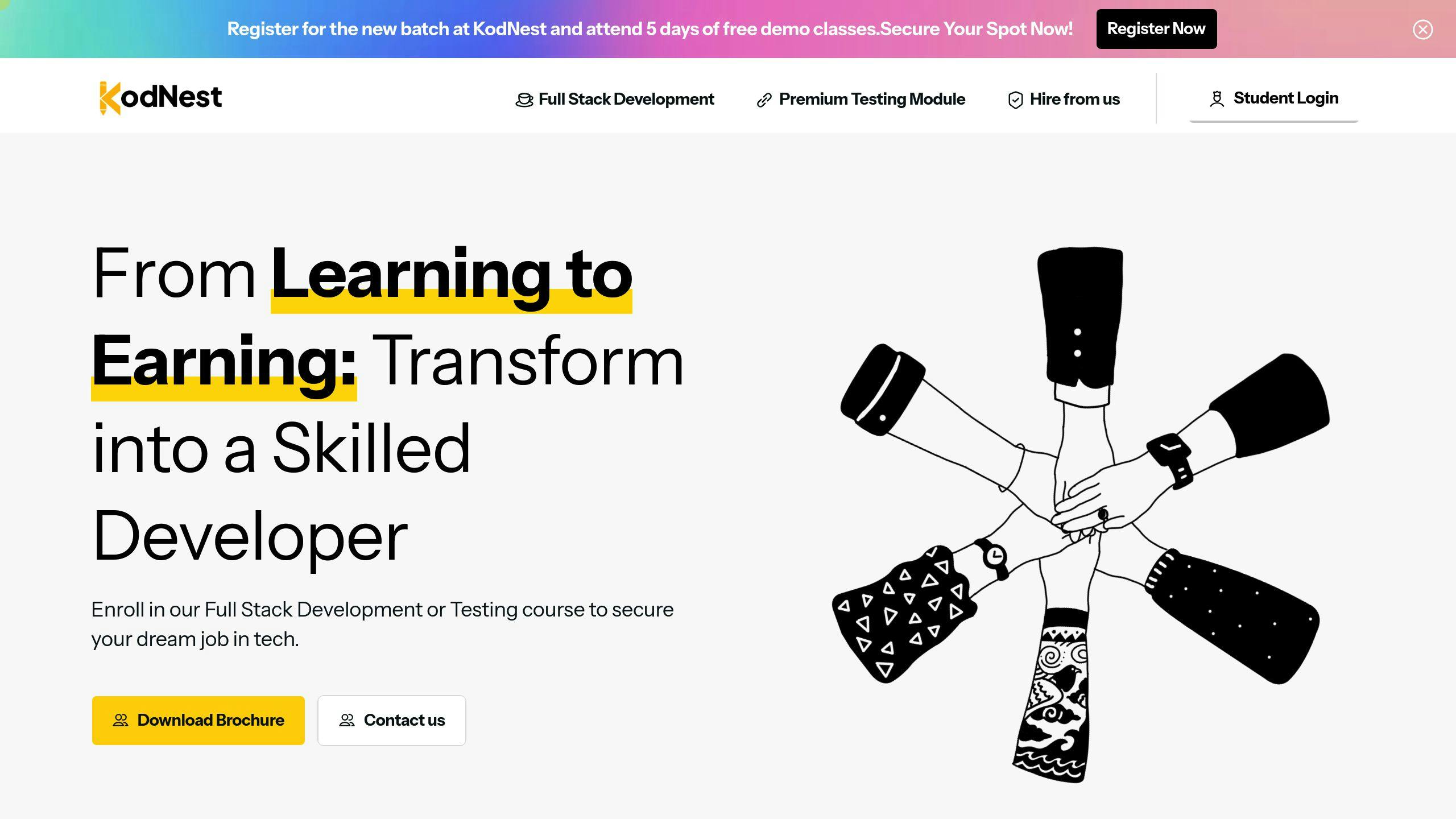Looking to become a full stack developer in Bangalore? Here’s what you need to know:
- What is Full Stack Development? It involves building both the front-end (user interface) and back-end (server, database) of web applications using tools like HTML, CSS, JavaScript, Node.js, and databases like MongoDB or MySQL.
- Why Bangalore? Bangalore, India’s tech hub, offers top institutes, job placement opportunities, and access to a thriving tech ecosystem.
- Top Institutes: KodNest, Scaler, Udemy and Upgrad provide hands-on training, project experience, and career support.
- Course Features: Programs range from 3 months to 18 months, covering front-end, back-end, databases, and cloud platforms, with fees starting at ₹26,999.
Quick Comparison of Institutes
| Feature | KodNest | AchieversIT | Skill-Lync | Vtricks Technologies |
|---|---|---|---|---|
| Duration | Flexible | 90-120 hours | 18 months | Flexible |
| Practical Training | AI-driven | 200-250 hours | Industry projects | Real-world projects |
| Key Strength | AI mentorship | Practical focus | In-depth curriculum | Experienced instructors |
| Career Support | Unlimited | Lifetime updates | Career guidance | Personalized |
Bangalore offers the perfect mix of learning, networking, and career opportunities to kickstart your journey as a full stack developer. Choose the right course, gain hands-on experience, and build a portfolio to succeed in this growing field.
Skills and Topics Covered in Full Stack Developer Courses
Front-End Development Basics
Students start by learning HTML, CSS, and JavaScript to create responsive and interactive user interfaces. The course gradually introduces advanced tools like React to prepare them for modern web development tasks [2].
Key topics include:
- Core web technologies and responsive design principles
- Building interactive UI components and using frameworks
- Advanced JavaScript techniques, including state management
- Front-end architecture for scalable applications
Once students have a solid grasp of front-end development, the focus shifts to back-end programming, where they learn to build reliable server-side systems.
Back-End Development Tools and Techniques
The back-end segment emphasizes server-side programming with tools like Node.js and Express.js for creating APIs [2][4]. Students work on:
- Fundamentals of server-side programming
- Developing efficient and well-documented APIs
- Implementing secure authentication systems
- Optimizing server performance for better scalability
With these skills, students progress to managing databases and cloud platforms, ensuring they can handle the full stack of application development.
Working with Databases and Cloud Platforms
Students learn to work with both SQL and NoSQL databases, focusing on practical database management and cloud integration. Key areas include:
- Designing structured and efficient database systems
- Writing queries and managing data relationships
- Applying security measures to protect database integrity
- Deploying and scaling applications using cloud services [2]
Building Projects and Gaining Practical Experience
Hands-on projects are a core part of the curriculum, allowing students to combine all the technologies they’ve learned into fully functional applications. These projects are designed to meet industry demands and prepare students for Bangalore’s competitive tech environment [2][3].
The practical training highlights:
- Managing the complete application lifecycle
- Following industry-standard development workflows
- Collaborating in teams using version control tools
- Deploying production-ready applications efficiently
Complete MERN Stack Developer Roadmap For Beginners
Best Institutes for Full Stack Developer Training in Bangalore
Bangalore’s vibrant tech scene makes it a prime location for full stack developer training. Several institutes here offer top-notch programs with a focus on practical skills and career placement. Here’s a look at some of the best options.
KodNest

KodNest stands out with its AI-driven learning approach and flexible program options. Their courses are priced at ₹31,999 for offline and ₹26,999 for online formats, and include:
- AI-powered guidance tailored to your learning speed
- Unlimited placement support, including mock interviews
- Training with tools and practices used in the industry
sbb-itb-f454395
Course Length, Certifications, and Costs
When selecting a full stack developer course, it’s important to consider how much time you’ll need to invest, the certifications you can earn, and the overall costs. These factors should align with your career objectives and learning preferences.
How Long Do Courses Take?
Full stack developer courses in Bangalore cater to a variety of schedules and learning styles. Here’s a breakdown of typical program formats:
| Course Format | Duration | Training Hours | Practical Hours |
|---|---|---|---|
| Fast-track Programs | 3-4 months | 90-120 hours | 200-250 hours |
| Standard Programs | 6-8 months | 180-240 hours | 300-400 hours |
| Comprehensive Programs | 12-18 months | 400+ hours | 600+ hours |
Certifications You Can Earn
AchieversIT certifications are designed to help graduates stand out in the job market [3]. These certifications showcase your skills in areas like front-end and back-end development, database management, and cloud deployment – key competencies for full stack developers.
Course Fees and Learning Options
The cost of these courses typically falls between ₹26,999 and ₹31,999. Many institutes offer flexible payment plans to make learning more accessible. You can choose from the following training formats:
- Classroom Training: Ideal for hands-on practice with direct guidance from instructors.
- Online Live Classes: Perfect for those who need flexibility but still want an interactive experience.
- Hybrid Programs: A mix of online and in-person sessions for a balanced approach.
Most institutes also provide demo classes, so you can assess their teaching style before committing to a program.
With the right course, certifications, and practical skills, you’ll be ready to dive into the exciting field of full stack development.
Career Paths for Full Stack Developers
Common Job Roles in Full Stack Development
Bangalore’s thriving tech scene offers plenty of opportunities for full stack developers. The skills gained during training programs can lead to roles such as:
| Role | Key Technologies |
|---|---|
| Full Stack Developer | Java, Python, React, Node.js, MongoDB |
| Front-End Developer | HTML5, CSS3, JavaScript |
| Back-End Developer | Java, Python, Node JS |
| Software Engineer | Cloud platforms, APIs |
Each role demands a mix of technical expertise and the ability to adapt to evolving tools and frameworks.
How Institutes Help with Job Placements
Training institutes in Bangalore play a crucial role in connecting education with employment. Institutes like AchieversIT and Vtricks Technologies offer placement support that includes weekly technical tests, resume-building workshops, mock interviews, and direct introductions to hiring companies [3][2].
By tapping into their partnerships with companies across Bangalore’s IT hub, these institutes focus on preparing students for the job market. Their approach emphasizes translating technical know-how into job offers through industry-specific guidance and networking opportunities.
Demand for Full Stack Developers in the Industry
Bangalore’s tech industry is growing rapidly, opening doors for full stack developers across various sectors. Some of the industries actively hiring include:
- IT Services: Developing enterprise-level applications
- E-commerce: Building retail platforms and payment systems
- Startups: Creating innovative web apps and digital products
- Financial Technology: Designing banking and investment platforms
Full stack developers bring expertise in both front-end and back-end development, making them indispensable in today’s tech landscape [2]. To stand out, focus on creating a portfolio filled with practical projects and stay updated on cloud technologies and modern development tools [3][2].
Bangalore remains a hotspot for tech talent, offering countless opportunities for full stack developers to grow and succeed in their careers.
Conclusion
Becoming a full stack developer typically takes 6-12 months, and Bangalore’s tech ecosystem connects students to a booming industry. The city’s high demand for tech talent ensures solid career opportunities for full stack developers [2].
Here’s how you can set yourself up for success:
- Pick an institute offering hands-on projects to build a strong portfolio.
- Take advantage of placement programs and stay informed about industry trends.
Enrolling in a full stack development course in Bangalore positions you for success by combining quality training with access to the city’s tech opportunities. This combination lays the groundwork for a thriving career in full stack development [2][1].
With the right education and a commitment to ongoing learning, you can carve out a successful future in Bangalore’s dynamic tech industry.





